
Mission Statement:
"To advance through research, education and symposia, an increased public awareness of the Cape Fear region's unique history."

Confederate Major Bernard’s Wilmington Star Newspaper
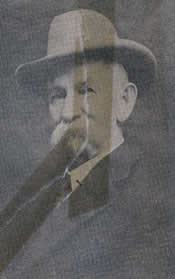
Major William Henry Bernard
Author James Sprunt writes in his “Chronicles of the Cape Fear”
that Wilmington’s “Morning Star” is the oldest daily newspaper
in North Carolina, founded on September 23, 1867 by
Major William Henry Bernard, formerly of the First
North Carolina Volunteer Regiment, also known as
the famed “Bethel Regiment.”
Bernard was born in Petersburg, Virginia on January 1, 1837,
the son of Peter Dudley Bernard who edited and published
the “Southern Planter.” Peter’s father, William’s grandfather,
fought under Washington during the Revolution and died
of wounds received at the battle of Brandywine.
While attending Richmond College, William was one of the
editors of “The Star,” a publication of the Mu Sigma Rho Society.
William relocated to Texas in 1855 to study law under William
Stedman, formerly of Chatham County, North Carolina.
He married Maggie Stedman of Fayetteville in 1859, left
for Helena, Arkansas where he remained until the outbreak
of war in 1861; though politically a Whig and against the
secession of North Carolina, he sided with his people
against a coercive federal government.
Bernard returned to Fayetteville to enlist on April 17, 1861
for six months at age twenty-four in Company H, First
Regiment, North Carolina Volunteers. William joined the men
of Company H, all members of the Fayetteville Independent
Light Infantry (FILI) under the command of Capt. Wright Huske,
and sent in May 1861 to Virginia where they fought at the
Battle of Big Bethel on June 10.
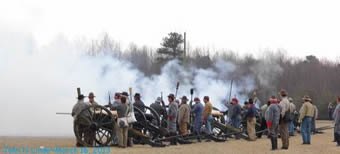
Afterward the First Regiment marched back to Yorktown
where it went to work on fortifications.
In early September the unit established “Camp Fayetteville”
nearby in honor of the ladies of that town who had crafted a
regimental flag inscribed with the word “Bethel” and presented
it to the regiment on September 9, 1861. Thus the unit became
known as the "Bethel Regiment."
Bernard served as a private along with Charles M. Stedman,
who both attained the rank of major, and was later discharged
for infirmity and returned to Fayetteville to work at the
“Presbyterian” and the “Daily Telegraph” until the end of
the war in 1865.
Bernard’s military career and promotion to the rank of major
after his initial service with the FILI is unclear – it is recorded
that he was discharged September 17, 1861.
In 1867, Major Bernard left Fayetteville to found the
“Wilmington Dispatch” with Col. John D. Barry, a Wilmington
native and commander of the Eighteenth North Carolina Regiment
during the war. Col. Barry’s grandfather was Gen. Thomas
Owen and his great uncle was North Carolina Governor
James Owen. Their Dispatch office was located on Market
Street’s south side between Front and Second Street
though their partnership lasted only a few months.
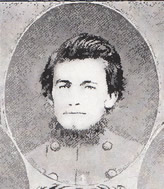
Col. John D. Barry
Bernard continued as an independent job-printing concern
and Barry was sole editor of the newspaper, which was
published for another three years before ceasing operations.
As noted above, Major Bernard began publication of the “Star”
in later September 1867, first as an evening edition though soon
converting to the “Morning Star.” His office was on Water Street
between Market and Dock Street, then shortly after relocated
to nearby Custom House Alley where he published until 1876.
In that year the “Star” moved to 10 and 11 Princess Street,
a former location of an old inn.
Also beginning editions in late 1867 was the Republican paper,
the Wilmington Post, which the editor expected to be successful
given the party support given by the dominant black population.
The Republican party had to subsidize the paper for its first
three years as only one-quarter of the black residents were
literate and could read, and had no businesses to advertise
in the paper.
Further, internal Republican politics further hurt the paper as black residents demanded the removal of editor Charles I. Grady in 1870,
who they accused of being “anti-Negro.”
The Star of Major Bernard covered the rise of the Ku Klux Klan
which had organized in Wilmington in early 1868 as a response
to the Radical Republican “Union League” which was used
to encourage black votes for Republicans and intimidate
white voters.
In its April 3, 1868 issue “the Star announced that some five
hundred people had called by its offices to view the Ku Klux Klan
drinking cup that was on display there. It described the cup as
being made from a human skull “elegantly set in lead”
[Evans, pg. 100). The purpose of the cup exhibit may have
been to alert local black Republicans to the presence of the Klan
organization in Wilmington.
Apparently, the Klan career in Wilmington was short and by the
end of April 1868 roving bands of armed blacks “by means of a
noisy barrage of gunfire” served notice of their intent to control the
polls. That this armed intimidation was successful is indicated
by the Republicans then-carrying the city by a two to one margin,
and won four of seven counties on the lower Cape Fear.
The editorials of the Star were condescending toward the increasingly egalitarian postwar politics in the city, disdainfully characterizing
“the people” as “the great unwashed, who for a few days since,
assembled in convention amid the sands of Dry Pond,” where
they had nominated their candidates. Dry Pond was a
notoriously poor area of Wilmington populated by blacks
and working-class whites.
Politically active in the Democratic party, though never seeking office himself, for twenty-seven years Major Bernard served as a member
of that party’s Executive Committee of North Carolina, and also
as a member of the Advisory Committee of the State party.
During his forty years of editorship he wrote daily columns
concerning important issues of the day and wielded considerable
influence in the State. He was a severe and bitter critic of
Reconstruction and Republican political corruption
in North Carolina.
Critical of the Republican ticket for city aldermen in mid-May
1868, the Star editorialized that some of the candidates were
said to be “Radical enough to eat snake-root,” though most
were “disposed to be conservative (observe, please, we don’t
use a capital C).”
Bernard supported Col. Alfred Moore Waddell’s successful
candidacy for the United States Congress in 1870, and managed
his reelection campaign in 1874. In 1891 Bernard managed the
North Carolina Senate campaign of John D. Bellamy, Jr., who
was elected and served 1891-1892. Bellamy went on to serve
as United States Congressman 1899-1903 with the support
of Major Bernard’s newspaper and influence.
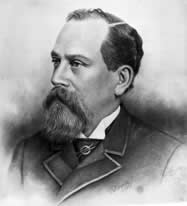
Col. Alfred Moore Waddell
Major Bernard’s newspaper was listed as one of the subscribers
to the Associate Press network of newspaper after 1893. Before
the old Illinois Associated Press Corporation began operations
on January 1, 1893, local papers which received AP service
belonged to a group called the Southern Associated Press,
one of seven regional groups which swapped news and did
other business with the original New York Associated Press,
founded in 1848.
While it seems impossible to say which local papers received
the Southern AP news, they must have been the same ones,
substantially, which received reports from the Illinois AP after
1893: Asheville Citizen, Charlotte Observer, News and Observer, Wilmington Star, Wilmington Messenger, and Winston-Salem
Journal.” (Stem, Jr., pp. 160-161)
Wilmington's racially-polarized political climate of the mid-1890s
saw the “Star” actively promoting the Democratic party in its
campaign to oppose the Fusion government of Populists and
Republicans. Fusion-Governor Daniel Russell used his patronage
powers extensively which allowed him to appoint five of the
ten city aldermen in Wilmington. “[The] Morning Star . . .
persistently attacked Wilmington city officials, charging
blacks and Republicans with incompetence, venality,
and insolence to whites, especially to white women”
(Steelman, pg. 75)
In supporting the Democratic party “white supremacy” campaign,
Major Bernard’s “Star” headlined its August 25, 1898 edition
with “Riotous Negroes! Threatening Demonstration by a Mob
Last Night on Princess Street. No Known Cause for it. Angry
Mutterings Against the whites – Police Inefficient or Indifferent –
Finally Persuaded the Angry Mob to Disperse.”
For the same purpose of inflaming white residents, from September
23 through November 7 the “Star” reprinted “the inflammatory
portions of [black Daily Record editor Alexander] Manly’s
editorial in a prominent place” in its pages. “The paper also
printed daily in conjunction with the Manly editorial the story
of an alleged rape attempt by two black boys of a fifteen-year-old
white girl.”(McDuffie, pg. 603)
As the Wilmington Chamber of Commerce supported and
promoted the “white supremacy campaign” of the Democratic
party, it developed resolutions, which the “Star” printed on
7 October 1898, holding that the Fusion city and county
government was a “menace to the peace and order of the
community,” and “arrests enterprise, hampers commerce,
and repels investment.”
The resolution continued that good civic order “was not possible
under government by the present political regime, whose existence
and power are predicated on the blind adherence of the Negro
element of our population.” (McDuffie, pg. 623)
In the 9th of October’s edition of the “Star,” it had been discovered
that New Hanover County Republican Executive Committee
chair William Lee, a black man, had tried to secretly purchase
rifles from the Winchester Arms Company with which to arm
black residents. Raising the alarm, Major Bernard’s front page
was emblazoned with “The Wilmington Negroes are Trying to
Buy Guns.” (McDuffie, pp. 625-626)
Major Bernard provided a report of the conflict in Wilmington
to the Fayetteville Observer on November 10, 1898: “As a result
of the rioting in the First Ward, Brooklyn, about 11:30AM,
William Mayo, a well-known and popular young man, was
fatally-wounded and George Piner was wounded in the side. Albert Chadwick was wounded in the arm, all white.
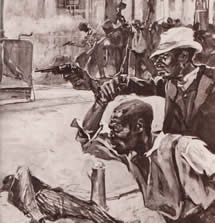
Four Negroes were killed and one wounded. A representative
of the Associated Press has seen a statement sworn to be by a
notary public from a reputable citizen in which it is particularly
stated that the first shot was fired by a Negro. (signed) Bernard.”
[Editor's note: William Mayo recovered from his wounds.]
The “Star” reported on November 13, 1898 that “the streets of
Wilmington will be patrolled by military until Monday night,
although a normal quietude already reigns. The Aldermen have
ordained that the bar-rooms shall continue closed until noon
Wednesday. They have not been open since Saturday, the 5th instant.
Mayor [Alfred Moore] Waddell today sent a number of well-known Negroes through the woods adjacent to the city to reassure the
hundreds of Negroes hiding . . . [that] they will not be harmed if
they go quietly about their work and maintain an
inoffensive deportment.” (Reaves, pg. 254)
The “Star” of that day also reported the “lists of fatalities so far
reported to the Coroner, as a result of the Brooklyn fight between
the whites and blacks, has reached the number of seven. The dead
(all Negroes) are Josh Halsey, Daniel Wright, William Mouzon,
John L. Gregory, John L. Townsend, Silas Brown (alias Charles Lindsey)and Sam McFarland.” (Reaves, pg. 254).
The “Star” covered the trial of Thomas Lane on November 15,
1898, a black man accused of firing into the Wilmington Light
Infantry (WLI) from 411 Harnett Street. From eyewitness
accounts, this is the firing which triggered the violence.
The paper stated that two black witnesses corroborated
the testimony of the WLI men.
Major Bernard subsequently wrote “Had not the Negro [Thomas]
Lane not fired into the military it would not have been necessary
for them to have shot John Halsey, a Negro occupant of the
place, who was killed as a sequel to Lane’s fiendish effort to kill
one of the members of the Light Infantry, who were on their
way to disperse a mob gathered on Ninth Street.”
It is noteworthy that three other black men captured along with
Lane at that house were released for lack of evidence against them. (Wilmington Star, November 16, 1898.
In 1909, at the age of 72, Major Bernard sold the “Morning Star”
to the “Wilmington Star Company, Inc.”, “the incorporators being
James Sprunt, Henry C. McQueen, M.J. Corbett, Col. Walker
Taylor, D.C. Love, C.W. Yates, William H. Sprunt,
Capt. John W. Harper, J.A. Springer, W.E. Springer,
James H. Chadbourn, James H. Carr, Joseph H. Thompson,
Major William H. Bernard, and his son William Stedman
Bernard.” For sentimental reasons the major and his son
retained a minor interest in the new corporate ownership.
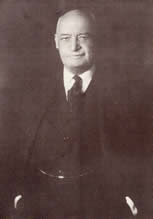
Col. Walker Taylor
Several of the incorporators were veterans or sons of veterans
of North Carolina regiments, and in the case of James Sprunt,
a purser on blockade runners.
In that year the office of the “Morning Star” and printing press
were moved to the Orton Building on Front Street near Chestnut –
and by 1913 the paper had not only doubled its circulation but
also gained readership in nearby counties and upper South Carolina.
As a fine example of responsible journalism and local control
of the newspaper and content, Sprunt writes that the paper devoted
its energies “to the educational and moral advancement of the
community, to advocacy of a commission form of government,
enforcement of law, and the general upbuilding of the community.”
In 1914, the newspaper was moved to its own building on
Chestnut Street between Front and Second Street, the current
site of the Copper Penny pub. Major Bernard passed away
on February 19, 1918 and was buried in Wilmington’s
Oakdale Cemetery.
The Morning Star was acquired by the R.W. Page Corporation
of Columbus, Georgia; two years later the same company purchased
the afternoon-daily Wilmington News-Dispatch. At the end of
September 1929, a combined morning and afternoon Sunday
edition appeared and entitled the “Sunday Star News.”
The corporation sold the News-Dispatch, Star, and Sunday
Star-News to R.W. Page in 1940 and combined the three
into the Star News Corporation.
Until his death in early 1955, Mr. Page served as president and
publisher of this newspaper corporation. Son Rye B. Page assumed control of the family-owned corporation for twenty years,
and in 1975 it was sold to the New York Times Company.
The ownership of Wilmington’s local paper by outside interests
affected the city and region in ways never envisioned by Major
Bernard, and which he would have certainly opposed.
The only notable contribution of the Star News to journalism
after Major Bernard’s time was the hiring of young Wilmington
native David Brinkley as a reporter in 1938. In 1940 he went on
to a national career with Chet Huntley and NBC News, and
subsequently ABC News.
Today, the current incarnation of Major Bernard’s “Star” has
lost considerable circulation and influence and was sold by the
New York Times Corporation in 2011 to Halifax Media,
then to New Media Investment in 2014.
Sources:
Chronicles of the Cape Fear, Sprunt, Edwards & Broughton, 1916
Politics in Wilmington & New Hanover County, 1865-1900, McDuffie, Kent State PhD Dissertation, 1979
The Tar Heel Press, Thad Stem, Jr., NC Press Association, 1973
Black, White & Gray, Bennett L. Steelman, NC Literary Review, Vol. II, No. 1, Spring 1994
North Carolina Troops, 1861-1865, A Roster, Louis H. Manarin, NCDA&H, 1971
NCpedia
©2006 Cape Fear Historical Institute